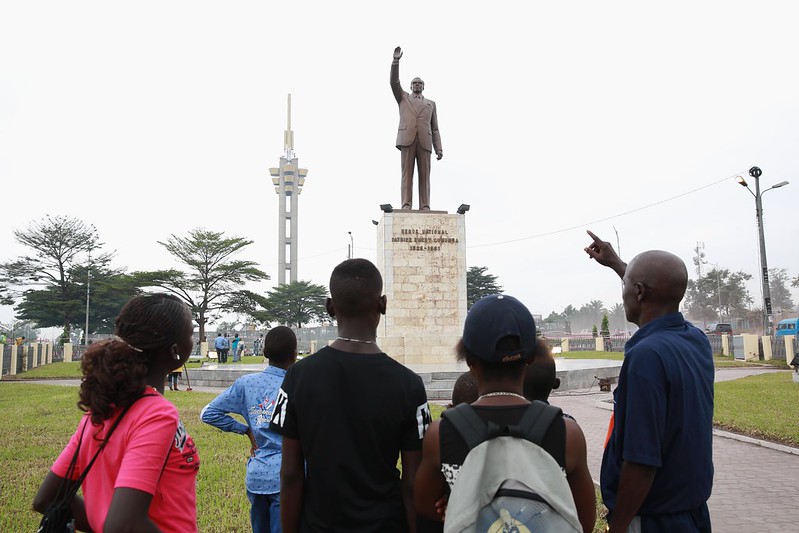63 years ago, Patrice Lumumba–the first democratically elected leader of Congo–was assassinated on January 17, 1961. Looking back to the end of the colonial period, Lumumba’s case was indicative of what the broader geopolitical context of Cold War post-colonial Africa was to become: marred by foreign interference and Western aloofness. His rise and fall illustrate how Soviet-American tensions wove their way into the African continent, imbuing foreign policy in these newly independent states with the kind of fearful rhetoric that facilitated the proliferation of colonial interests in Africa long after the dissolution of the European empires.
Patrice Lumumba was born on July 2, 1925, in the Belgian Congo as part of the Batetela tribe. Compared to other ethnic groups in the region–such as the Lundas and the Bakongos, from which his principal rivals heiled–the Batetelas were fairly small. This meant that where other leaders continued to be characterized largely by regional and ethnic distinctions, Lumumba’s movement and political career were able to take on a more pan-Congolese character.
From very early on, Lumumba had a strong desire to join Belgian Congo’s Black middle class, and, therefore, was an avid reader of French classics and political philosophy, and was deeply engaged in civic life in Stanleyville (now Kisangani). By the early 1950s, Lumumba was involved in the leadership of at least seven civic groups in Stanleyville, including the Belgian Liberal Party in the Congo. In 1955, he made his first official foray into politics when he became the regional president of a Congolese trade union of government employees.
Although Lumumba’s legacy often paints him as an overzealous, radical, nationalist, his early years in politics illuminate a very different perspective. At the beginning of his political career, Lumumba was hesitant not to ‘rock the boat’, and endorsed racial equality in the Congo, though he did so in the mildest terms possible. In a 1952 writing, Lumumba went so far as to proclaim “We promise docility, loyal and sincere collaboration to all those who want to help us achieve, in union with them, the element that is beyond us: civilization,” a message that piqued the attention of many Belgian officials in Congo, due to its deferential tone. In 1956, Lumumba was arrested on charges of embezzlement, and sentenced to 12 months in prison. While in prison, his perspective began to change, taking on some of the more radical tones he is known for today. During his time in prison, he directly experienced Belgian cruelty, writing about deplorable conditions including food that “a European would never serve to his dog,” and began to sharpen his political consciousness.
Upon his release, Lumumba became increasingly involved in Congolese politics, eventually founding the Congolese National Movement (MNC), the first nationwide Congolese political party. The MNC continued to rise in power and popularity, particularly in Stanleyville. Following political unrest triggered by the Belgian government’s announcement of a gradual process of independence, Lumumba was arrested for inciting riots. Nonetheless, the MNC garnered sweeping victories in local elections, eventually resulting in Lumumba’s release from prison.
June 30, 1960, was the first official day of Congolese independence, marked by a ceremony in which Belgian King Baudoin gave a now-infamous speech. As the great-grandson of King Leopold II–who inflicted unspeakable tragedies upon the Congolese in what has been noted as “the ugliest episode in European colonial history”– Baudoin gave an abhorrently condescending speech directed at the Congolese people, informing them that independence would be “achieved not through the immediate satisfaction of simple pleasures but through work”. Baudoin’s lecture was followed by Congolese President Joseph Kasavubu, a generally ceremonial position, who effectively toed the party line by giving a largely forgettable speech.
What happened next was a moment that not only cemented Lumumba’s legacy within Congo but also served as the catalyst that marked him as a target in the eyes of the West–particularly in the United States and Belgium. When Lumumba took the stage after Kasavubu, he gave what was evidently a direct reply to Baudouin, delineating the daily humiliation, violence, and cruelty that Black Africans suffered under Belgian occupation and proclaiming that “We who suffered in our bodies and hearts from colonialist oppression, we say to you out loud: from now on, all that is over.”
From that moment on, Lumumba represented a threat to Western interests in post-colonial Africa, proving that he would not stand down and accept the international order that was being presented to him. Seven months later, he would be dead.
The plot that resulted in Lumumba’s assassination combined American and Belgian intelligence and military forces, as well as Congolese accomplices, particularly in Katanga. Thanks to its abundance of natural resources, Katanga was a region of particular geopolitical importance in Congo and was governed pre-independence effectively by mining interests. During the political unrest that followed independence, Moise Tshombe took advantage of the opportunity to declare Katanga a secessionist state–bolstered by Belgian troops who were sent in to secure the region.
Christened, “the worst African ever born,” by Malcolm X, Tshombe shared Belgian concerns that Lumumba would take control of the mining profits coming out of Katanga, and thus quickly became his fiercest enemy. Lumumba requested assistance from the United Nations (UN), headed at the time by Swedish diplomat Dag Hammarskjöld, to squash the secessionist rebellion and expel Belgian forces from the supposedly independent nation. Despite Hammarskjöld’s liberal tendencies and desire to facilitate the development of sovereignty in newly independent states, his immediate dislike of Lumumba himself led him to strictly limit his options–refusing to send UN troops to Katanga, and meeting directly with Tshombe rather than Lumumba himself.
Lumumba also visited Washington in an attempt to garner support and additional resources. However, here too he was met with hostile and often racist sentiments from government officials. This attitude was made all too clear by a now-infamous National Security Council meeting attended by President Eisenhower, Central Intelligence Agency (CIA) Director Allen Dulles, and Under Secretary of State Douglas Dillon. When discussing Lumumba and Hammarskjöld, Dulles made repeated allegations that the former was engaged with the Soviets, although he had only turned to them for limited aid after his calls to the West had fallen on deaf ears. It was the President himself, however, who made the most notable comment of the meeting, saying “something…that came across… as an order for the assassination of Lumumba”.
With major global powers quickly turning against him, Lumumba was dismissed from his position by President Kasavubu–a move whose legitimacy he swiftly disputed–and subsequently arrested twice by Mobutu, who was backed by the CIA. Escaping from his second arrest, Lumumba was caught and beaten savagely as UN soldiers looked on with little concern for legal punctilio. Fatefully, Lumumba was then flown to Katanga along with some of his associates–a plan that the head of CIA operations in Congo, Larry Devlin, was aware of and chose to stay quiet about–where he faced another horrific beating from Tshombe and his Belgian colleagues. Finally, he was taken to a remote location where he was killed alongside two fellow party members.
Even amongst political assassinations, Lumumba’s death tends to stand out, in large part due to the barbarism and finality of the act. Following the murder, Lumumba’s body was cut into pieces and melted with acid, almost as if to destroy any chance that he–or his legacy–could linger. For many Congolese today, Lumumba’s assassination is understood as the nation’s “original sin”, so to speak, acting as a hurdle to the long-held ideals of national unity, economic independence, and pan-Africanism for which he advocated. Moreover, American interference–spurred by the fear of Soviet influence in Lumumba’s ear–began a pattern of obstruction that was repeated throughout the continent for the duration of the Cold War. We will never know how Congo, or the world, could have developed should Lumumba have been allowed to live out his full tenure as leader. It is arguably just as likely that he would have failed on his own accord, should he have had the chance, regardless, though, this chance should not have been stolen from him.
Edited by Mayah Esmail

Liliana Mason is in her fourth and final year at McGill University, currently pursuing a B.A. in Political Science with a double minor in African Studies and Canadian Studies. She is particularly interested in African politics, the African diaspora, and the effects of climate change on human migration.

